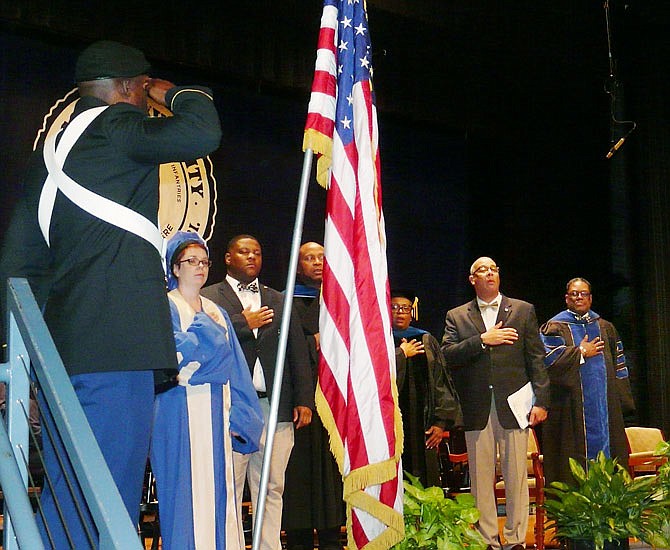Lincoln University must do more to keep students coming back to the Jefferson City school, new President Jerald Jones Woolfolk told those attending the Opening Convocation Thursday morning.
"If not for you, there would be no need for Lincoln University," Woolfolk told students in the audience. "It is for you that the valiant soldiers of the 62nd and 65th Colored Infantries had the foresight and understanding that, if we were to have a better life, education must be a part of our future."
Those Missouri soldiers, sitting around a Texas campfire while waiting to be mustered out of the Army at the end of the Civil War, dreamed of starting a school where freed slaves could learn to read, write and do basic math - all skills they were forbidden to learn under an 1847 Missouri law prohibiting even basic education for black people.
After its beginning in September 1866, in an abandoned wooden building that once housed Jefferson City's first public school, Lincoln Institute became a state-owned school and eventually the official college for African Americans to attend in a segregated society that barred people of color from attending schools like the University of Missouri-Columbia.
Now, as Lincoln's new, 20th president, Woolfolk noted, people want to know what her vision for the 152-year-old school's future looks like.
"My vision is your vision," she said, pointing to the vision statement curators adopted last year, as they were beginning their search for the school's 20th president.
"Part of that vision indicates that Lincoln is to be an exemplary, well-resourced land grant university - a community of scholars dedicated to the creation and dissemination of knowledge," Woolfolk said. "I believe that the better question you should ask is, 'How do we make our vision become our reality?'"
And the answer to that question, she said, involves helping students be more successful in their academics, making sure they have "a well-rounded educational experience both inside the classroom and outside the classroom."
Students want to know that teachers, administrators and staff "are honestly vested in their success, and that we genuinely care about them as students, and as people," Woolfolk said. "They want to know that we will go the extra mile to help them - and that they are not a bother to us."
After all, she repeated, without students, there would be no need for a university.
She said LU has little trouble recruiting students "because, for an institution our size, bringing in a class that averages about 500 new, first-time and transfer students is a great job."
But, she noted: "Our problem is keeping them here - retaining them - (because) almost 50 percent of our students do not return after their first year."
She challenged faculty and staff to give students "your very best."
And she urged the students to do the same, giving "150 percent" of their effort to "go beyond what is required and do what is necessary so that you can achieve the goal you have set for yourself."
LU's future will be better if students, faculty, staff and administrators work as a team, because "there is not one of us who has the answer to everything (or) can get the job done alone," Woolfolk said.
In addition to its historical place as being founded by African American soldiers, Woolfolk said, Lincoln today also has an unusual role as "perhaps one of the most diverse universities in our country. While we celebrate our diversity, we must make sure that everyone who walks through our doors feels a sense of belonging - and a sense of inclusion.
"Everyone must feel welcome. There must be room at the table for all - because it is our diversity which makes us stronger."
Working together, regardless of individuals' different backgrounds, will help Lincoln find success in its classes and in the community, Woolfolk said.
"My commitment to you is that I will be here with you, fighting in the trenches" to help make the changes Lincoln needs to survive in the future, she said.
"I awake every morning with confidence that for Lincoln University, the best is yet to come."

